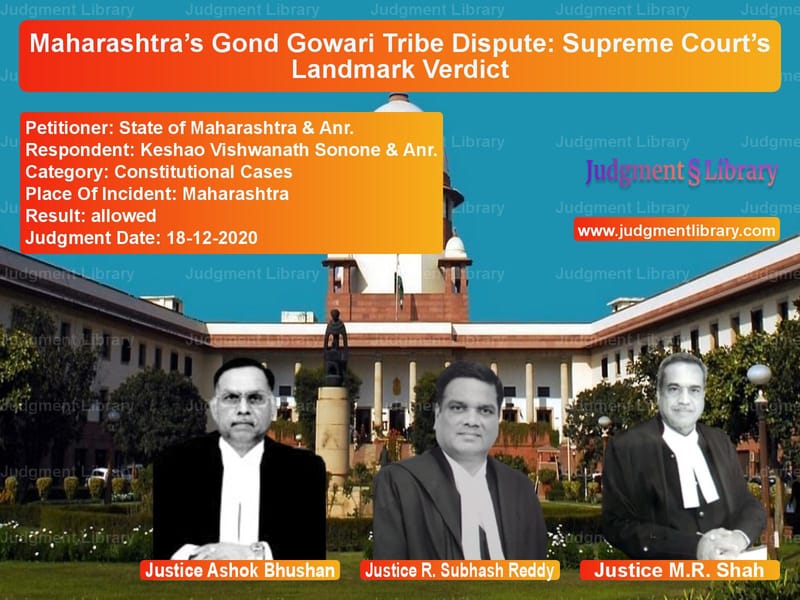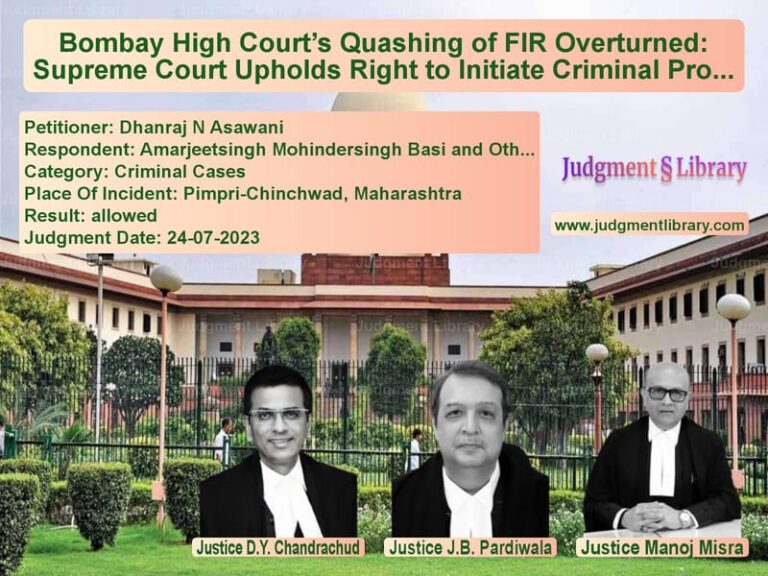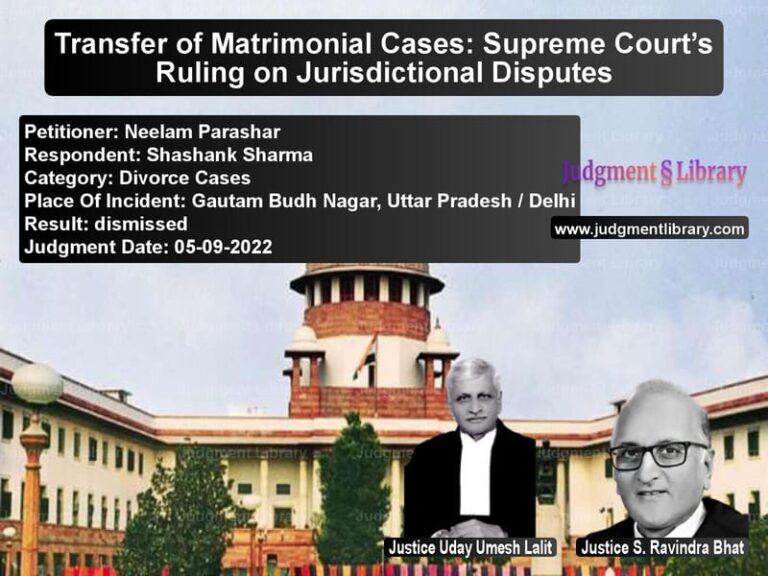Maharashtra’s Gond Gowari Tribe Dispute: Supreme Court’s Landmark Verdict
The Supreme Court of India, in its judgment on State of Maharashtra & Anr. vs. Keshao Vishwanath Sonone & Anr., addressed the long-standing controversy regarding the tribal status of the ‘Gond Gowari’ community in Maharashtra. This dispute revolved around whether ‘Gond Gowari’ should be classified as a separate Scheduled Tribe or if it was a misclassification of the ‘Gowari’ community, which does not enjoy Scheduled Tribe status.
The Bombay High Court had earlier ruled in favor of petitioners who argued that ‘Gond Gowari’ does not exist as a distinct Scheduled Tribe and that the community members wrongly availed ST benefits. The Maharashtra government and affected individuals challenged this decision before the Supreme Court.
Background of the Case
- The Constitution (Scheduled Tribes) Order, 1950 recognized ‘Gond Gowari’ as a Scheduled Tribe in Maharashtra.
- Petitioners argued that ‘Gond Gowari’ was a non-existent community and that certificates were fraudulently obtained.
- The High Court ruled that individuals belonging to ‘Gowari’ but claiming ‘Gond Gowari’ ST benefits should have their certificates invalidated.
- The Maharashtra government filed an appeal, arguing that the High Court overstepped its jurisdiction.
Petitioner’s Arguments
The State of Maharashtra and affected individuals argued:
- The term ‘Gond Gowari’ has existed in official records for decades and was recognized under the Scheduled Tribes Order.
- The High Court’s decision would result in widespread disqualification of ST certificates already granted.
- The issue of classification should be decided by the government and competent authorities, not by judicial interpretation.
- The ruling created uncertainty for thousands of individuals already employed or educated based on their ST status.
Respondent’s Arguments
The petitioners before the High Court argued:
- There is no distinct ‘Gond Gowari’ community, and the classification was historically incorrect.
- The ‘Gowari’ community, which forms the majority of claimants, was not entitled to ST benefits.
- Several caste scrutiny committees had invalidated ‘Gond Gowari’ certificates in the past.
- Allowing continued ST benefits would be unfair to genuinely recognized Scheduled Tribes.
Supreme Court’s Observations
The Supreme Court, in its ruling delivered by Justices Ashok Bhushan, R. Subhash Reddy, and M.R. Shah, made the following key observations:
1. Legality of ‘Gond Gowari’ as a Scheduled Tribe
The Court reaffirmed that the inclusion of ‘Gond Gowari’ in the Scheduled Tribes Order was deliberate and could not be altered by judicial review.
“The classification of Scheduled Tribes is within the domain of the executive and legislature, and courts should not interfere with such determinations.”
2. High Court’s Overreach
The Supreme Court criticized the Bombay High Court for going beyond its jurisdiction:
“The High Court cannot nullify a Scheduled Tribe classification based on historical analysis. Such decisions rest solely with Parliament and the President of India.”
3. Protection of Existing ST Certificates
The Court held that ST certificates already granted to individuals claiming ‘Gond Gowari’ status could not be invalidated retroactively without a legislative amendment.
4. Fairness in Reservation Benefits
The Supreme Court acknowledged the petitioners’ concerns but ruled that rectifying historical misclassification required executive action rather than judicial intervention.
Final Judgment
- The Supreme Court set aside the Bombay High Court’s ruling.
- Declared that ‘Gond Gowari’ remains a Scheduled Tribe in Maharashtra.
- Directed authorities to honor ST certificates already issued.
Implications of the Judgment
This ruling has significant implications:
- Reaffirms that Scheduled Tribe classification falls within the legislative domain.
- Protects thousands of individuals from the risk of losing ST benefits.
- Prevents judicial interference in matters of policy classification.
- Clarifies the distinction between judicial review and legislative powers in reservation matters.
The ruling provides much-needed clarity on the legal status of ‘Gond Gowari’ and ensures that the community retains its rightful place in the Scheduled Tribes category.
Petitioner Name: State of Maharashtra & Anr..Respondent Name: Keshao Vishwanath Sonone & Anr..Judgment By: Justice Ashok Bhushan, Justice R. Subhash Reddy, Justice M.R. Shah.Place Of Incident: Maharashtra.Judgment Date: 18-12-2020.
Don’t miss out on the full details! Download the complete judgment in PDF format below and gain valuable insights instantly!
Download Judgment: State of Maharashtra vs Keshao Vishwanath So Supreme Court of India Judgment Dated 18-12-2020.pdf
Direct Downlaod Judgment: Direct downlaod this Judgment
See all petitions in Fundamental Rights
See all petitions in Constitution Interpretation
See all petitions in Legislative Powers
See all petitions in Public Interest Litigation
See all petitions in Judgment by Ashok Bhushan
See all petitions in Judgment by R. Subhash Reddy
See all petitions in Judgment by Mukeshkumar Rasikbhai Shah
See all petitions in allowed
See all petitions in supreme court of India judgments December 2020
See all petitions in 2020 judgments
See all posts in Constitutional Cases Category
See all allowed petitions in Constitutional Cases Category
See all Dismissed petitions in Constitutional Cases Category
See all partially allowed petitions in Constitutional Cases Category







